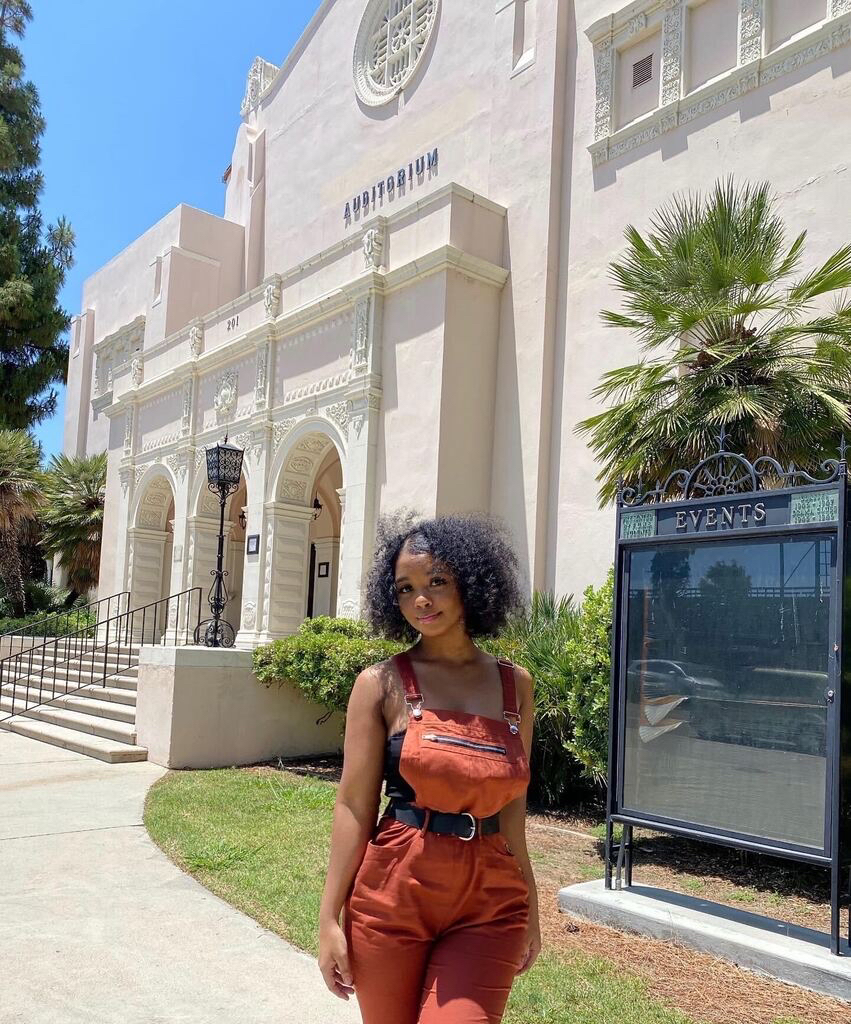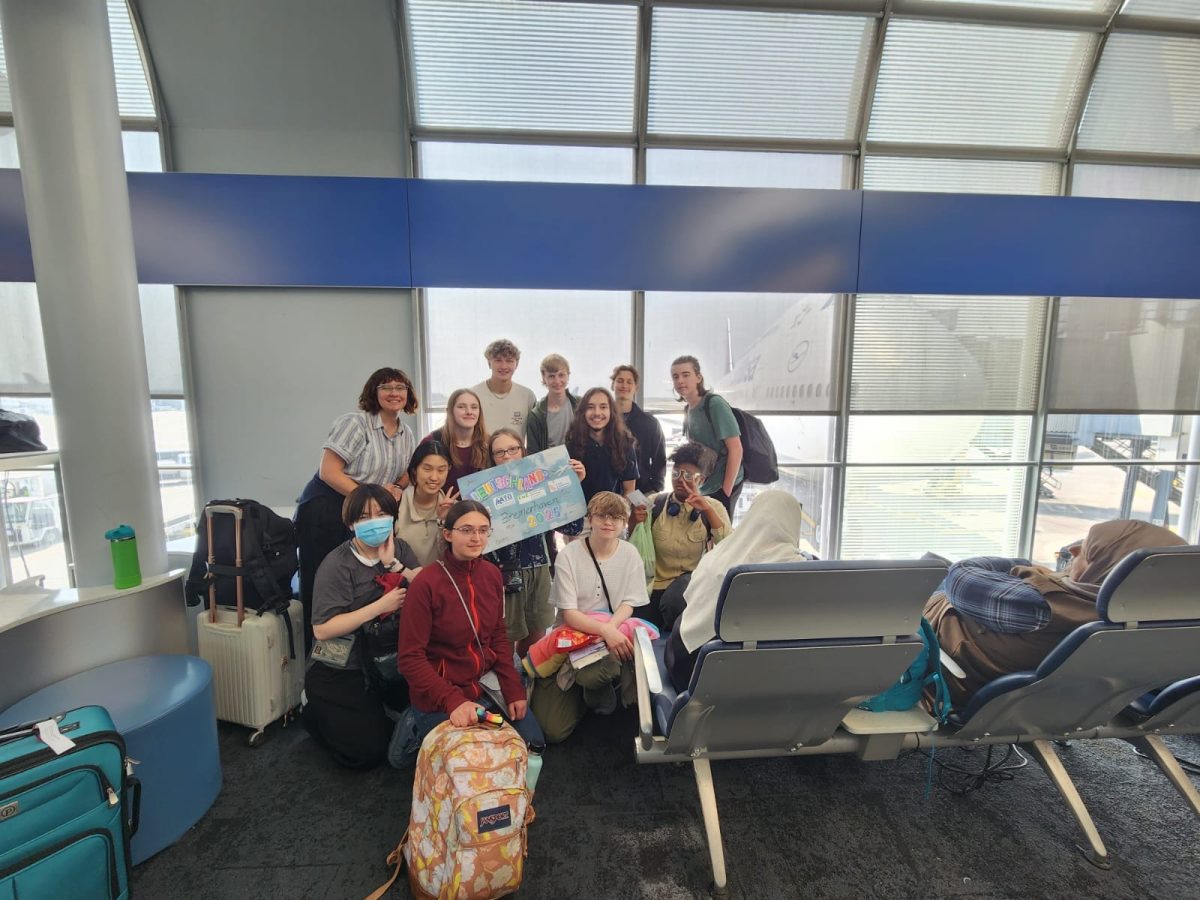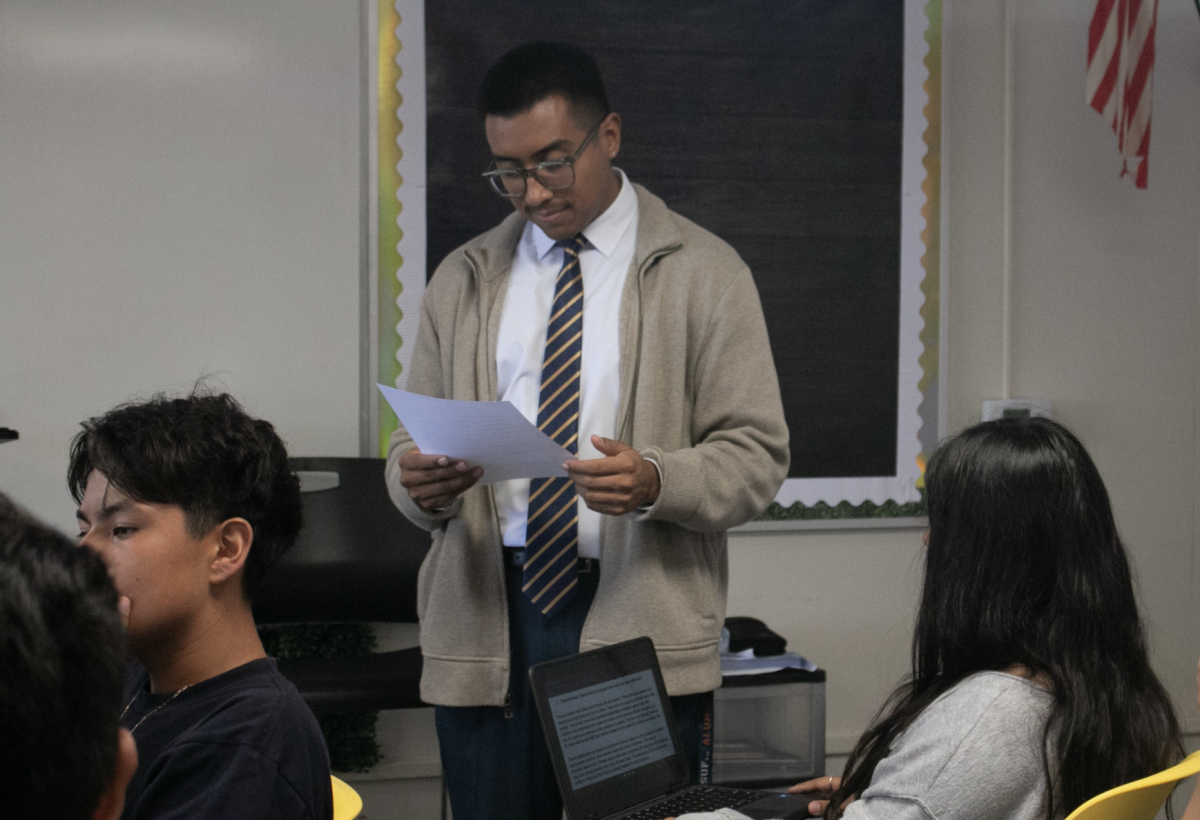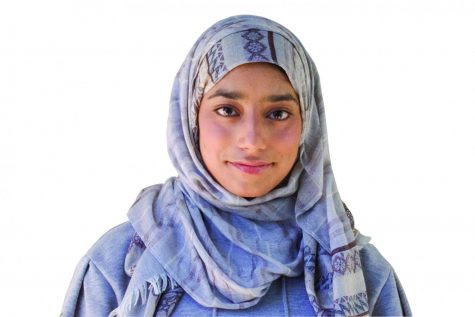Originating in the 19th century, social justice was not on the minds of many of her peers when Jackie Logwood attended Sunny Hills from 2016-2019.
While Logwood had to contend against the pressures of getting good grades, scoring high in her SAT and Advanced Placement exams and maintaining her friendships, she didn’t neglect her passion for social activism, especially in her last year of high school.
Being half Filipina and half African American, Logwood was instrumental in restarting the school’s Black Student Union [BSU], which had not existed in her freshman to junior years.
“Including mixed people, there were only 38 Black people when I was in high school, and I wanted them to have the same experience others did,” said Logwood, who spent her whole junior year planning to get the club approved through the Associated Student Body.
She then heard from her younger sister at Parks Junior High School that some students there had started using the “n” word out loud on campus without much regard for how offensive the term is.
“I tried to organize an assembly [there] … to try to show that the ‘n’ word is not meant for everybody to be used, and it’s a negative slur,” said Logwood, who had scheduled meetings with Parks administrators about her concerns but ultimately was unable to organize any talks with middle school students.
As a freshman last year at the University of California, Riverside [UCR], Logwood didn’t forget about her alma mater. She spearheaded what became a successful campaign for the removal of a name used for a Fullerton Joint Union High School District [FJUHSD]-owned auditorium where plays and awards ceremonies are held.
Less than a month away from the one-year anniversary of the FJUHSD school board’s historic decision to remove “Louis E. Plummer” in front of the rest of the proper title, “Auditorium,” Logwood reflects on how she originally got involved with an online petition to spark the movement and what other social justice changes she’s been a part of and hopes to see happen.
RIGHT PLACE, RIGHT TIME
George Floyd died on Memorial Day Monday, May 25, 2020, two months into the coronavirus pandemic and lockdown in several states. Floyd’s death at the hands of a Minneapolis Police officer sparked a series of protests nationwide, many of which involved the Black Lives Matter [BLM] movement.
Nearly two weeks later, Logwood said a friend, Maddy Marks, sent her an Instagram post on June 4.
“I had just posted the history of Plummer auditorium to my Instagram story for the Fullerton community to get a sense of ‘how close to home’ the BLM movement was,” Marks recalled. “I feel like a lot of white people in Fullerton fail to recognize their privilege and fail to observe it throughout the history of our city.”
A sophomore at Fullerton College at the time, Marks said she first recognized Plummer’s alleged association with the KKK through a post on the community college’s website, where it states Plummer “with other prominent Fullerton residents joined the Fullerton [KKK] in the 1920s.”
(Plummer was an educator from the early 20th century who dedicated three decades of his career as a teacher, administrator and superintendent at Fullerton Union High School and Fullerton Community College, according to Fullerton College online archives.)
Five minutes after reading Marks’ post, Logwood said she created a petition on change.org titled, “Change the name of the ‘Louis E. Plummer’ Auditorium.”
“The ‘Louis E. Plummer Auditorium’ was built in 1930, and has since been a center of entertainment for the Fullerton community,” according to the beginning of Logwood’s online petition. “Not only do students gain their first experiences in drama, dance, and music there, the auditorium is used to stage important theatrical productions and community-oriented cultural programs.
“As a proud member of the Fullerton community, I stress that it is time that we stop honoring Fullerton’s racist past. … Such an important building for the community should not continue to bear the name of a white supremacist, of a proud and active KKK member.”
Looking back, Logwood said she never expected her change.org petition would garner so much interest – reaching 10,000 digital signatures in only two days.
“I just started [the petition] without really thinking about it,” she said. “I wanted to raise awareness on the issue but didn’t expect it to have that big of an impact.”
Three years ago, the issue of renaming the auditorium at the intersection of Chapman and Lemon avenues was brought up by a small group of people organized on Facebook. FJUHSD board members at that time researched the claims, but no change was made.
Logwood acknowledged that the BLM movement’s sudden rise in supporters last year could have contributed to the petition’s success.
“A lot of people were looking for something to do, and signing a petition was an easy way to help,” she said.
FROM CHANGE.ORG TO CHANGED THAT NAME
Logwood didn’t stop at just creating her online petition on change.org.
She said she emailed FJUHSD superintendent Scott Scambray and members of the board of trustees on June 4 – the same day after creating her petition — stressing how “it is time [Fullerton residents] stop honoring Fullerton’s racist past” and that “such an important building for the community should not continue to bear the name of a white supremacist.”
Two days later on June 6, Scambray sent an email response informing Logwood that the name change had been added to the agenda of the board’s next meeting on June 16.
“Thank you for taking an active role and expressing your opinion,” Scambray wrote in his email.
In hopes of collecting enough signatures to show trustees before that meeting, Logwood said she decided to share the link to her online petition with her 1,400 Twitter and 5,300 Instagram followers, resulting in 69,000 views on her original tweet.
Little did Logwood know that she had one of the trustees on her side working behind the scenes.
“Logwood’s petition made it clear that there was community support for a name change,” said Joanne Fawley, one of the five members of the FJUHSD board.
Fawley said she saw the petition through Facebook when it came upon her feed on June 5 and put the removal of Plummer’s name from the auditorium on the board meeting agenda the same day.
“A few years ago, the connection between Plummer and the KKK was learned, so I have been supportive of a change since then,” she said. “I am happy Plummer was removed; it is important to demonstrate to our students and community that everyone is welcome and supported.”
Rather than the killing of Floyd or the fear of repercussions if the board had done nothing, Fawley said it was her morality that prompted her to add the name change onto the agenda.
“I was hopeful that with a new board [this time around] that there would be support [for the removal],” she said. “It was the right thing to do and the right time.”
Nevertheless, without knowing ahead of time what Fawley was thinking, Logwood felt compelled to attend the June 16 virtual Zoom meeting with the rest of her family, including her siblings, parents and grandparents.
“With all the support the petition got, I would’ve been really disappointed if it did not get passed,” the UCR business major said.
During the public comments portion of that meeting before trustees addressed that agenda item, board members had heard from both sides of the issue. A minority of voices felt Plummer’s involvement with the KKK remained unclear, though no one from Plummer’s family showed up virtually to clarify any uncertainties.
After some discussion among the trustees, the board unanimously voted in favor of removing the old name much to Logwood’s delight.
“I felt really confident and empowered by its success,” she said.
Three days later, the name “Louis E. Plummer” no longer remained on the front of the building. For the time being, the building will be known as the “Auditorium,” informally called the Fullerton auditorium. As of earlier this year, no discussion has been put on the board agenda to select a new name.
“The focus is on dealing with the pandemic,” Fawley said. “[The Auditorium] is not necessarily the permanent name.”
Rather than naming the building after another person, Logwood said she favors the name, “Fullerton Auditorium,” and finds it the most fitting when taking into consideration Fullerton’s diverse population.
“No other building is named after a person in the entire district, and to have one that’s named after someone associated with the KKK is so peculiar for Fullerton,” she said. “This is Fullerton – we’re very open and inclusive here.”
WHAT’S NEXT FOR LOGWOOD
As of May 17, Logwood’s change.org petition remains live with 32,132 signatures.
“I left the petition up because it serves as a part of history and so that people can still add their signature,” she said. “The petition serves as a reminder that it isn’t hard to make a change in the world and to get involved in your community.”
Logwood said she is certain that had she known the history behind Plummer Auditorium during her years at Sunny Hills, she would have taken the necessary steps to demand for the name removal.
“I would absolutely have done more and tried to get people to start signing petitions early,” she said.
Other Sunny Hills alumni have praised Logwood’s actions.
“I expected the petition to get a lot of support because Logwood worked hard to spread the word, and she was very passionate about it,” said Class of 2019 graduate Sama Suliman, who served as Logwood’s BSU co-president. “It was in the middle of everything when everyone wanted positive change.”
Class of 2019 graduate Jonathan Rikitu, also a former BSU member, said he wasn’t surprised with Logwood’s social justice activism.
“She was always vocal, and getting the Plummer Auditorium renamed was a great thing,” Rikitu said.
After her success with the Plummer Auditorium, Logwood began putting pressure on the Brea Olinda Unified School Board district to remove alleged KKK member William E. Fanning’s name from an elementary school. The change.org petition, started by Vivian Gray, accumulated over 3,000 signatures.
The Brea-Olinda Unified School District board voted 4-1 on July 7, 2020, to rename the elementary school Falcon Academy of Science and Technology.
“It’s way easier than you’d think to be an active participant in this world,” Logwood said. “I didn’t think I’d be able to get the building renamed, but I did it.”
As a current sophomore at UCR, Logwood has recently partnered with that same younger sister who’s now a sophomore at Troy High School — Marilyn Logwood — David Taylor and Jacquelyn Morán to produce an online petition published April 22 on The Action Network, which addresses the lack of ethnic studies provided at all eight schools in the Fullerton Joint Union High School District. Logwood aims for an ethnic studies class to be offered by the 2022-2023 school year.
“I just feel like it would be beneficial as a community who learned about all different cultures instead of just [Advanced Placement] U.S. history, and all the white people that come with it,” Jackie Logwood said.
The inspiration from the petition came from the Santa Ana Unified School District, which had already introduced ethnic studies into its curriculum. Public schools, however, are not required by the state’s board of education to offer ethnic studies.
“I’m pretty flexible with [how ethnic studies will be implemented], because I know that budget is a factor as well, and staff is affected,” Jackie Logwood said. “It could even be a summer course.”
She also hopes that the ethnic studies class can delve deeper into other cultures and not just limited to the heritage of Black people.
“We can be enlightened about all the different cultures and all the different contributions,” she said. “I’m hoping that more colored historical figures will be prominent in our education.”
As of May 4, the petition has accumulated 689 signatures, surpassing Logwood’s initial goal of 500 by the end of its first week. Her next goal is 1,000 signatures by the end of its fourth week, which was on May 14.
“We’re hoping to just get a lot of letters … and open forums sent into the [May 11] board meeting so they could read the perspectives of the community,” Jackie Logwood said. “[The board] could see how many people are agreeing with it by looking at the petition and see how many people agree that ethnic studies should be required.”
At their May 11 board meeting, trustees heard from four speakers during the public comments portion, three of whom were against the district adding such a course into its curriculum.
However, assistant superintendent Sylvia Kaufman presented information to board members that district officials are looking into adding ethnic studies as an elective two years from now. Meanwhile, students in the district can take a similar class through an agreement with Fullerton College.
Trustees also clarified that the agenda item was for informational purposes only, so they were not required to vote on the district’s plan.
Nevertheless, Logwood said she feels board members will provide adequate guidance for what will happen with an ethnic studies curriculum in the district.
“I know that the board is pretty open minded and fairly liberal so I have quite a bit of confidence that they will add ethnic studies to [the curriculum], or at least have some form of alternative,” she said.
As Logwood wraps up her second year of college, she is also considering a change in her major, but not to political science or international relations.
Instead, she’s looking into switching to biology or chemistry.
“Working as a life insurance agent gave me a lot of experience in business, and I think that’s cool, but I don’t feel fulfilled or mentally challenged,” said Logwood, who now plans on pursuing a career in medicine.







